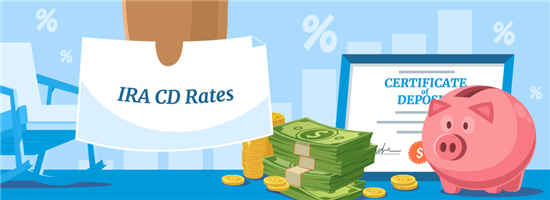IRA CD Rates
Ad Disclosure: This article contains references to products from our partners. We may receive compensation if you apply or shop through links in our content. This compensation may impact how and where products appear on this site. You help support CreditDonkey by using our links.
Saving for a worry-free retirement? Get ahead with the top IRA CD rates.
 |
- Discover Bank:
IRA Certificate of Deposit - Up to 4.00% APY - Wells Fargo:
IRA Certificate of Deposit - Up to 2.25% APY - Citibank:
IRA Certificates of Deposit - Up to 4.15% APY - Ally Bank:
IRA High Yield CD - Up to 4.00% APY - Synchrony Bank:
IRA CD - Up to 4.15% APY - America First Credit Union:
IRA Certificate Account - Up to 4.35% APY - Space Coast Credit Union:
IRA CD - Up to 4.25% APY - Suncoast Credit Union:
IRA CDs - Up to 4.25% APY - All In Credit Union:
IRA Certificate - Up to 4.18% APY - First Florida Credit Union:
IRA Certificates - Up to 4.18% APY - Achieva Credit Union:
IRA Certificate of Deposit - Up to 4.10% APY
The dream is to kick back and relax in retirement. Being financially comfortable at that age would be perfect.
Getting an IRA CD could help make that a reality. But would it be a good fit for your plans? Find out if an IRA CD suits you and the best IRA CD rates today.
IRA Certificate of Deposit - Up to 4.00% APY
- No minimum opening deposit required
- No fees
- FDIC insured
| Term | CD Rates |
|---|---|
| 3 Months | 2.00% APY |
| 6 Months | 3.70% APY |
| 9 Months | 4.00% APY |
| 1 Year | 4.00% APY |
| 1.5 Years | 3.80% APY |
| 2 Years | 3.80% APY |
| 2.5 Years | 3.50% APY |
| 3 Years | 3.50% APY |
| 4 Years | 3.50% APY |
| 5 Years | 3.50% APY |
| 7 Years | 3.50% APY |
| 10 Years | 3.50% APY |
Wells Fargo: IRA Certificate of Deposit - Up to 2.25% APY
| CD Term | APY |
|---|---|
| 1-2 Months | 0.01% |
| 3-5 Months | 2.00% |
| 6-11 Months | 2.00% |
| 12-23 Months | 2.00% |
| 24-35 Months | 2.25% |
| 36-47 Months | 1.01% |
| 48-59 Months | 1.01% |
| 60-71 Months | 1.01% |
| 72-144 Months | 1.01% |
APYs are for balances below $100,000.
Citibank: IRA Certificates of Deposit - Up to 4.15% APY
| Term | APY |
|---|---|
| 3-Month | 4.08% |
| 4-Month | 4.08% |
| 5-Month | 3.25% |
| 6-Month | 4.08% |
| 7-Month | 3.00% |
| 8-Month | 0.05% |
| 9-Month | 4.15% |
| 10-Month | 3.77% |
| 1-Year | 3.56% |
| 13-Month | 3.75% |
| 18-Month | 3.75% |
| 2-Year | 1.01% |
| 30-Month | 0.10% |
| 3-Year | 2.00% |
| 4-Year | 2.00% |
| 5-Year | 2.00% |
Ally Bank: IRA High Yield CD - Up to 4.00% APY
| CD Term | APY |
|---|---|
| 3 Months | 2.90% |
| 6 Months | 4.00% |
| 9 Months | 3.90% |
| 12 Months | 3.90% |
| 18 Months | 3.80% |
| 3 Years | 3.50% |
| 5 Years | 3.50% |
Synchrony Bank: IRA CD - Up to 4.15% APY
- Up to 4.15% APY
- Up to 5 years
- $0 minimum opening deposit
- Ability to open Roth or Traditional IRA
- Ability to add funds during 10-day grace period after CD maturity
- FDIC Insured
America First Credit Union: IRA Certificate Account - Up to 4.35% APY
- Up to 4.35% APY
- $500 minimum opening deposit
| Term | APY |
|---|---|
| 3-5 Months | 4.35% |
| 6-11 Months | 4.35% |
| 12-17 Months | 4.35% |
| 18-23 Months | 4.10% |
| 24-29 Months | 4.10% |
| 30-35 Months | 4.10% |
| 36-47 Months | 4.15% |
| 48-59 Months | 4.20% |
| 60 Months | 4.20% |
Space Coast Credit Union: IRA CD - Up to 4.25% APY
| Terms | APY |
|---|---|
| 3 Months | 4.00% |
| 6 Months | 4.05% |
| 9 Months | 4.10% |
| 12 Months | 4.25% |
| 18 Months | 4.10% |
| 24 Months | 3.75% |
| 30 Months | 3.55% |
| 36 Months | 3.55% |
| 42 Months | 3.60% |
| 48 Months | 3.65% |
| 54 Months | 3.70% |
| 60 Months | 3.75% |
Suncoast Credit Union: IRA CDs - Up to 4.25% APY
| Terms | APY |
|---|---|
| 6 Months | 3.95% |
| 12 Months | 3.95% |
| 18 Months | 4.00% |
| 21 Months | 4.25% |
| 24 Months | 4.00% |
| 36 Months | 4.00% |
| 48 Months | 4.00% |
| 60 Months | 4.00% |
All In Credit Union: IRA Certificate - Up to 4.18% APY
| Terms | APY |
|---|---|
| 3 Months | 3.56% |
| 6 Months | 4.18% |
| 9 Months | 3.66% |
| 12 Months | 4.13% |
| 18 Months | 4.07% |
| 24 Months | 3.97% |
| 36 Months | 3.87% |
| 48 Months | 3.87% |
| 60 Months | 3.87% |
First Florida Credit Union: IRA Certificates - Up to 4.18% APY
| Terms | APY |
|---|---|
| 3 Months | 3.29% |
| 6 Months | 3.55% |
| 12 Months | 4.07% |
| 18 Months | 4.07% |
| 24 Months | 4.18% |
| 30 Months | 3.75% |
| 36 Months | 3.55% |
| 48 Months | 3.29% |
| 60 Months | 3.29% |
Achieva Credit Union: IRA Certificate of Deposit - Up to 4.10% APY
| Terms | APY |
|---|---|
| 6 Months | 3.25% |
| 9 Months | 3.00% |
| 12 Months | 4.10% |
| 18 Months | 3.15% |
| 24 Months | 2.90% |
| 30 Months | 2.00% |
| 36 Months | 1.80% |
| 48 Months | 1.75% |
| 60 Months | 1.75% |
What is an IRA CD?
An IRA CD combines an individual retirement account (IRA) and a certificate of deposit (CD). Basically, it's a CD with tax benefits that help you save for retirement.
The common types of IRAs are Traditional and Roth. Both are tax-advantaged accounts, but they differ in when you pay taxes.
With a Traditional IRA CD, your contributions are tax-deductible, but you'll pay taxes on withdrawals. While with a Roth IRA CD, your contributions are with post-tax dollars, but withdrawals will be tax-free.
CDs are good if you want predictable earnings and low risk. IRAs give you tax benefits and can let you invest in a variety of assets that could give higher returns for higher risks. Depending on your risk tolerance and financial situation, either can be a better option.
Who Should Get an IRA CD?
IRA CDs are best for folks who are near or at retirement. At retirement, you will likely want to preserve wealth or grow your funds conservatively. With an IRA CD, you get steady, guaranteed returns because of the fixed rate and term.
It's a very low risk investment since IRA CDs are federally insured for up to $250,000 [1]. Plus, if you are a member of a federally insured credit union, your IRA deposits are insured separately up to $250,000 under the NCUSIF in case you have more than one account in the same credit union.[2].
CDs in general are great for the risk-averse. If you simply want to diversify your retirement savings with safe investments, an IRA CD is a good option.
Most banks and credit unions require you to be aged 18 and above to open a CD, including IRA CDs. And technically, there is no age requirement to contribute to an IRA. But IRA CDs are best for older folks near retirement.
IRA CD Rules
Here are some IRS rules to know for IRA CDs:
- If you're opening a new IRA CD, you'll be subject to the annual limit of $7,000 in 2024 ($8,000 if age 50 and older).[3]
- There is no maximum if you rollover from an existing retirement account.
- Early withdrawals before 59-1/2 may have a 10% penalty.[4]
Not sure whether you should get a Traditional or Roth IRA CD? The main question is whether paying taxes now or later will be more beneficial to you.
Here is a comparison to help you decide.
| Traditional IRA CD | Roth IRA CD |
|---|---|
| Contributions are tax-deductible | Contributions are not tax-deductible |
| Earnings grow tax-deferred | Earnings grow tax-free |
| Withdrawals are taxed | Withdrawals are tax-free |
| Penalties for early withdrawals before age 59½ | Contributions can be withdrawn penalty-free anytime, but not necessarily earnings |
| No income limits for contributions (but what's tax-deductible may vary) | Income limits for contributions apply |
| Required minimum distributions (RMDs) start at age 72 | No required minimum distributions (RMDs) |
| Beneficial if you expect to be in a lower tax bracket during retirement | Beneficial if you expect to be in a higher tax bracket during retirement |
The IRS provides resources that can guide you further. But if you need professional help, it's best to talk to a tax advisor.
It depends on your financial status and risk tolerance. If you're nearing or in retirement, an IRA CD will be good to preserve and passively grow your savings. If you want to diversify your portfolio, an IRA CD is a viable low-risk investment.
Pros & Cons of an IRA CD
Before you put money into an IRA, weigh the perks and pitfalls that come with an IRA CD.
Pros:
Predictable, guaranteed returns
Your earnings are guaranteed since the rate on your IRA CD is fixed for the entire term. It will not change regardless of market changes. You will know exactly how much you expect to earn.
Secure and low-risk investment
Like most CDs, your IRA CD is federally insured, so you can rest easy even if your bank or credit union fails.
Diversifies your retirement portfolio
Getting an IRA CD can help balance your portfolio because it is a low-risk investment. This is effective when your retirement funds also contain riskier assets.
Cons:
Early withdrawal penalties
With an IRA CD, if you withdraw before age 59-1/2, you'll be subjected to a 10% penalty. Plus, the bank itself will also penalize you if you withdraw before the CD matures.
Missed investment opportunities
Your money is locked in. It makes it difficult to shift to a better investment when they come. If you're far from retirement, you're probably better off with higher-risk, higher-return investments than IRA CDs.
Inflation
Unfortunately, if you keep a long-term IRA CD, it may not grow fast enough to keep up with inflation. Remember that your rate is fixed in a CD, so it will not change to match with increasing inflation.
How Much Interest Does an IRA CD Earn
If you placed $10,000 of your retirement funds into a 1-year IRA CD with an APY of 3.5%, it can earn about $350.
What you earn on an IRA CD depends on the amount of money in the CD, the APY, and the term length. In general, the higher they are, the higher your earnings will be.
Here's a table illustrating how much your IRA CD can grow in one year with different APY and deposit amounts.
| APY | $6,500 | $10,000 | $25,000 |
|---|---|---|---|
| 0.00% | $6,500 | $10,000 | $25,000 |
| 0.50% | $6,533 | $10,050 | $25,125 |
| 1.00% | $6,565 | $10,100 | $25,250 |
| 1.50% | $6,598 | $10,150 | $25,375 |
| 2.00% | $6,630 | $10,200 | $25,500 |
| 2.50% | $6,663 | $10,250 | $25,625 |
| 3.00% | $6,695 | $10,300 | $25,750 |
| 3.50% | $6,728 | $10,350 | $25,875 |
| 4.00% | $6,760 | $10,400 | $26,000 |
| 4.50% | $6,793 | $10,450 | $26,125 |
| 5.00% | $6,825 | $10,500 | $26,250 |
| 5.50% | $6,858 | $10,550 | $26,375 |
Some institutions offer the same rates for their IRA CDs and regular CDs. But some also give different rates for each. Banks and credit unions can set the rates of their CDs at their discretion as long as they meet the rate caps published by the FDIC[5].
Can I Lose Money in an IRA CD?
No. Your money is safe in an IRA CD. CDs are federally insured for up to $250,000 by the Federal Deposit Insurance Corporation (FDIC).
And if your IRA CD is from an NCUA member credit union, you may obtain additional separate coverage of up to $250,000 from the National Credit Union Share Insurance Fund (NCUSIF).
However, you could lose money from penalties. If you withdraw early before age 59-1/2, there's a 10% penalty on the withdrawn amount (a Roth IRA CD may have exceptions).
Additionally, if you withdraw before the CD matures, the bank itself charges an early withdrawal fee too. So in theory, you could be subjected to 2 types of penalties.
Alternatives to IRA CDs
IRA CDs might not be the best option for everyone. You want to invest wisely and confidently for things like your retirement. Here are other investments you can consider:
Traditional Savings Account:
For quick access to your funds while earning from competitive interest rates, high-yield savings accounts are a good choice. But the rates can change over time, unlike IRA CDs.
- NexBank:
High-Yield Savings Account - 4.35% APY - CIT Bank Platinum Savings:
$300 Bonus - Discover® Online Savings:
$200 Cash Bonus - Western Alliance Bank:
High Yield Savings Account - 4.25% APY - UFB Portfolio Savings:
Earn up to 4.01% APY - Mission Valley Bank:
High Yield Savings Account - 4.27% APY - First Community Bank:
High-Yield Savings Account - 4.26% APY - DR Bank:
High-Yield Savings Account - 4.25% APY - Paprika Capital Bank:
High-Yield Savings Account - 4.22% APY - Dayspring Bank:
High-Yield Savings Account - 4.17% APY
Money Market Accounts:
A money market account is hybrid of a savings and checking account. It gives you the flexibility you need with your money. But like any other savings account, the rates are not fixed.
- UFB Portfolio Money Market:
Earn up to 4.01% APY - American First Credit Union:
Money Market Deposit Account - 4.30% APY - Generations Bank:
Money Market Deposit Account - 4.29% APY - Prism Bank:
Money Market Deposit Account - 4.29% APY - Harborstone Credit Union:
Money Market Deposit Account - 4.25% APY - UNCLE Credit Union:
Money Market Deposit Account - 4.24% APY - First National Bank of Brookfield:
Money Market Deposit Account - 4.23% APY - SkyOne Federal Credit Union:
Money Market Deposit Account - 4.20% APY - Grand Bank:
Money Market Deposit Account - 4.20% APY - Hanover Bank:
Money Market Deposit Account - 4.20% APY
Stocks and Bonds:
If you invest in good, reputable companies with sound and solid financials, investing in their stocks and bonds can give you stable dividends in the long run. But you will have to take more risks and do your due diligence when choosing a company.
Gold IRA:
Gold IRAs is another option if you want to preserve wealth and safeguard your retirement. You can convert a portion of your 401k or other retirement accounts into physical gold. But gold can also be volatile, and gold IRAs have more fees.
Free Gold IRA Kit
- Up to $10,000 in free silver for eligible customers
- Highest buyback price, guaranteed
- Endorsed by Sean Hannity and Chuck Norris
Real Estate Investments:
Investing in real estate can be promising if you manage to secure a profitable property. You can earn good rental income or make money from property value appreciation.
You can also use a real estate investing platform like Fundrise to invest passively.
Invest in Real Estate with $10+
- Only $10 minimum investment
- Get a diversified portfolio of real estate projects across the US
- Open to all investors
Ultimately, you should choose investments that will best suit your retirement goals. Make sure you have a good portfolio strategy when choosing your investments.
Typically, you won't lose money on an IRA CD since you get a fixed interest rate. Plus, CDs are federally insured.
Other IRA investments may not give the same level of security and predictability. Adding CDs to your portfolio is a good option to diversify risk.
IRA CD FAQs
Do IRA CDs earn interest?
Yes, IRA CDs earn interest just like other CDs. However, depending on the institution, the rates offered for IRA CDs might be different from the rates for regular CDs. Ask your bank about their IRA CD rates before opening one.
Can I withdraw from my IRA CD without penalty?
Usually, you cannot withdraw your IRA CD without paying penalties. Like any regular CD, you're expected to lock in your money until it matures. And if you withdraw before age 59-1/2, you could be subject to 10% penalty from the IRS too.[6]
How do I transfer my IRA CD to another bank?
To transfer your IRA CD to another bank, you will need to close it first. Then "rollover" or deposit the funds to open a new CD at a different bank. Take note that when you close your initial IRA CD, you may have to pay early withdrawal penalties.
What are the contribution limits on an IRA?
According to the IRS, the annual contribution limit for 2024 on your IRA is $7,000 ($8,000 if you're 50 or older). You can open an IRA at any time. And anyone with taxable earnings can contribute to an IRA.
Bottom Line
Getting ready for retirement is a big task, and if you want to play it safe, an IRA CD is a good option. But if you're younger, you might want to look at riskier investment options for higher earnings.
Take your time to manage and grow your retirement portfolio. Ultimately, you'll want to make sure that you make wise decisions for your future.
References
- ^ FDIC. Certain Retirement Accounts, Retrieved 08/14/2023
- ^ NCUA. How Your Accounts are Federally Insured Brochure, Retrieved 08/14/2023
- ^ Internal Revenue Service. Retirement Topics - IRA Contribution Limits, Retrieved 09/02/2024
- ^ IRS. Retirement Topics - Exceptions to Tax on Early Distributions, Retrieved 11/14/23
- ^ FDIC. National Rates and Rate Caps, Retrieved 08/14/2023
- ^ Internal Revenue Service. IRA FAQs - Distributions (Withdrawals), Retrieved 10/10/2023
Write to Rue Atanacio at feedback@creditdonkey.com. Follow us on Twitter and Facebook for our latest posts.
Note: This website is made possible through financial relationships with some of the products and services mentioned on this site. We may receive compensation if you shop through links in our content. You do not have to use our links, but you help support CreditDonkey if you do.
Fundrise, LLC ("Fundrise") compensates CreditDonkey Inc for new leads. CreditDonkey Inc is not an investment client of Fundrise.
|
|
|







